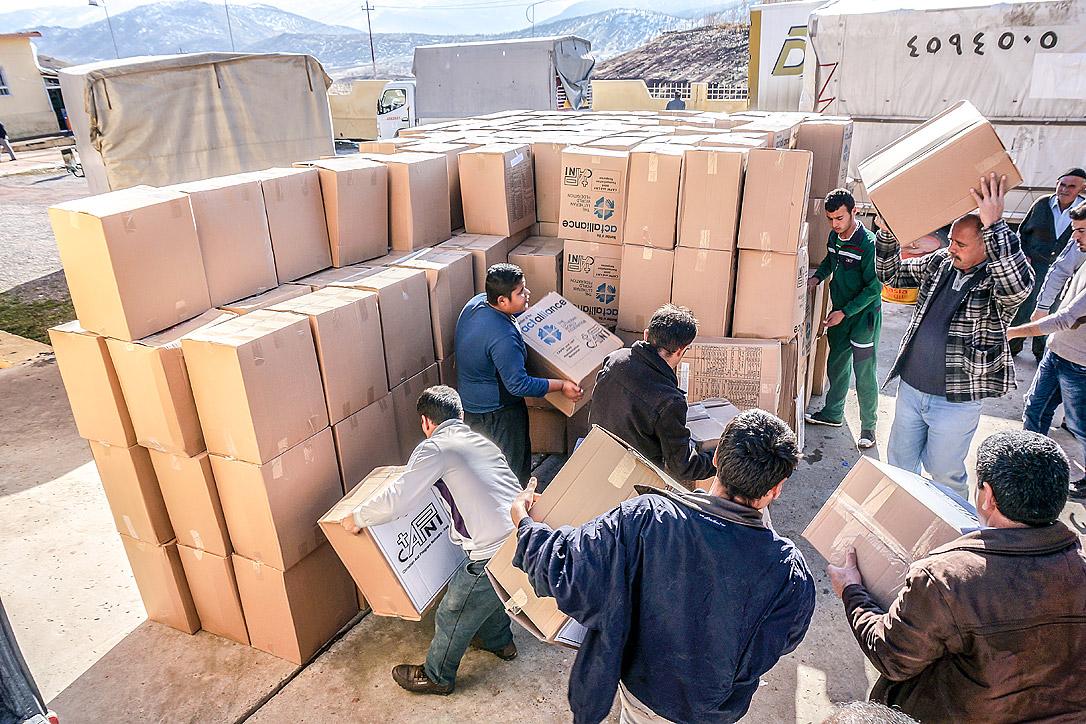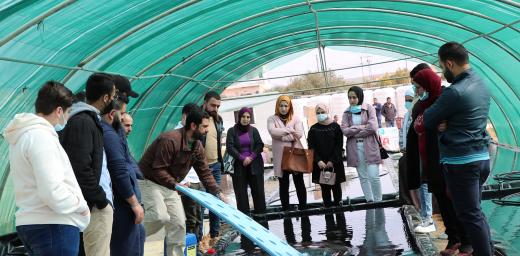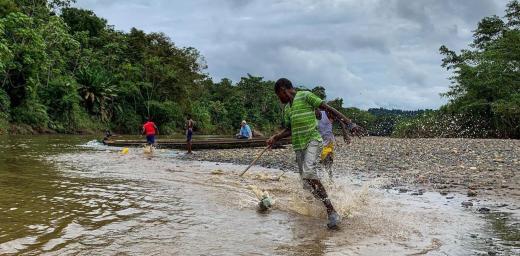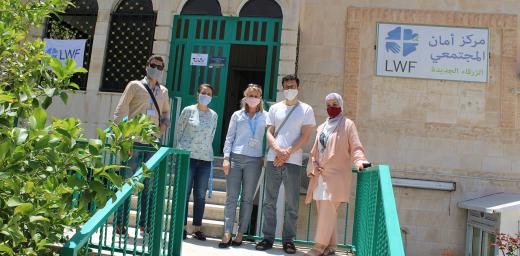LWF Consolidates Emergency Operation in Iraq

Distribution of winter clothing to refugees in Khanki camp, Dohuk. Photo: Sandra Cox
Interview with Roland Schlott, LWF Humanitarian Coordinator
(LWI) - At its first meeting in 2015, the Lutheran World Federation Committee for World Service was informed about the opening of an emergency operation in Iraq. The LWF has been assisting the refugee crisis in Iraqi Kurdistan since August 2014. Together with and through local implementing partners, LWF has supported people displaced from Mosul, Sinjar and the Nineveh plain with shelter, non-food items and psycho-social support. After assisting through an implementing partner for the first months, LWF will now be working with their own registration in Iraq.
In an interview with the Lutheran World Information (LWI), LWF Humanitarian Coordinator Roland Schlott talks about the challenges in setting up the operation and dealing with one of the largest refugee crises worldwide.
Why did the LWF decide to respond in Iraq?
The LWF is committed to serving the most poor and vulnerable with special regard for refugees and internally displaced persons. We decided to respond because of the dramatic humanitarian needs and the high count of internally displaced persons (IDP) in Northern Iraq.
In July 2014, the militant IS invaded Iraq’s second largest city, Mosul, which has about 4 million inhabitants. The militia inflicted atrocities on ethnic and religious minorities, including the Christian population. In August 2014, the situation in Iraq was declared one of the most severe emergency (“Level 3-emergency”) by the UN. The Emergency Response Strategy of The Lutheran World Federation (LWF) recommends the presence of LWF in all emergencies of that magnitude. We also had a request for help from the Christian Aid Program in Northern Iraq (CAPNI), a local organization which has worked in the region for many years and is also a longstanding partner of the LWF member church in Bavaria. That member church requested our assistance as well.
How did the LWF set up the operation?
Following immediate deployment of a former LWF staff member who had worked in Iraq in previous years, we identified a number of options for LWF’s engagement. We have three so-called emergency hubs on different continents, from where experienced staff can be sent to places where support is needed. The LWF Humanitarian Coordinator deployed two relief workers from the LWF Emergency Response Hub in Kathmandu, Nepal and a Project Manager from the LWF Jordan Program. They have been on site in Northern Iraq continuously between mid-August and End of December 2014 and assisted the 450,000 displaced people who have taken shelter in Dohuk governorate.
In the beginning, LWF worked as support to CAPNI and the Jiyan foundation/ Kirkuk Center for Torture Victims who were already established in the area. However, it soon became evident that in order to meet the large needs of the people, a greater response capacity was needed. As more donations came in, we also needed additional structures for organizing procurement and distribution quickly and effectively. Therefore the LWF since early January 2015 worked towards obtaining its own registration and operational set-up.
How did the LWF assist?
In the beginning, we assisted people who were internally displaced especially with food baskets and items such as blankets, mattresses, kitchen utensils and hygiene kits. We distributed winter clothing to families and gave wheelchairs to displaced people with disabilities. We also set up bore holes and helped with shelter improvements. Many people do not live in camps but in host communities, in unfinished buildings or houses which are in very poor condition. We provided plastic sheets, wooden frames, hammers and nails to insulate the buildings against the cold wind.
We also did rehabilitation work in public schools, where refugees had been living during the summer break. In addition we provide counseling and community-based psycho-social support together with the Kirkuk Center for Torture Victims and the Jiyan foundation. Until now we have spent about 1 million USD for the response in Iraq, supported by many members of the ACT Alliance.
What were the biggest challenges?
The biggest challenge was the overwhelming needs. There is an enormous number of displaced people, and many of them could not bring any of their belongings because even their suitcases where taken from them when they left. Due to the large number of people in need, there are also many humanitarian actors on the ground. We need to coordinate very carefully to avoid lack of coverage or duplications. We found the local coordination done by the mayor’s offices in the host municipalities most reliable. The high proportion of displaced people living in a scattered pattern among the host population settlements is challenging even to UN mechanisms.
How did you meet those challenges?
The LWF has successfully issued an appeal for funding. The appeal will be extended to cover the year 2015 and to raise the support needed. To improve coordination, LWF is regularly meeting with working groups of different organizations. We also consult with local authorities, and our staff members are gathering further information through conducting their own assessments. This way we try to identify gaps and mitigate the challenges.
How do you see the situation in Iraq developing?
The situation in the city of Mosul, the Nineveh plain and Sinjal is still volatile. Many of the displaced people come from these areas. We do not expect that they will be able to return anytime soon.
The authorities of Iraqi Kurdistan pursue a military solution to dominate the IS forces with their own Peshmerga soldiers. There is also the potential of a conflict if a referendum on secession of Kurdistan from the rest of Iraq will go forward as proposed.
Many people were not attacked directly, but left for fear of being attacked. This happened for example in the town of Alqosh near Dohuk, from which most of the displaced people in Dohuk originate. Some of them returned after the Kurdish Peshmerga army had recaptured the area, but they are only a small percentage of the people who fled to Dohuk.
The border areas between Iraq and the autonomous region of Kurdistan seem to be safe. With the support of the international community people might be able to settle here. The LWF will therefore continue assisting the displaced people and their host community in Dohuk governorate and in locations of return in the Alqosh area.





